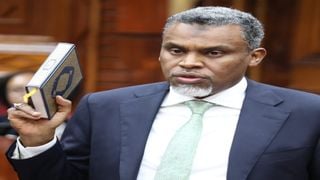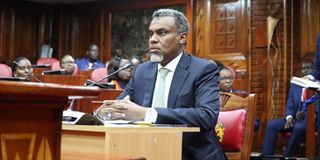
Nominee for Director General National Intelligence Service Noordin Haji before the National Assembly Departmental Committee on Defence, Intelligence and Foreign Relations at the County Hall for vetting.
| Dennis Onsongo | Nation Media GroupWeekly Review
Premium
Noordin Haji, the Kenyan spy who came from the cold
While he was not the first prospective National Intelligence Service chief to be subjected to televised vetting by Parliament, Mr Noordin Haji became the first to attract intense public scrutiny on the nomination, including court challenges and open objections by various interest groups questioning his suitability for the sensitive and powerful post.
That is a reflection of the fact that President William Ruto’s choice to succeed Major General Philip Kameru was tapped from a high-profile assignment as Director of Public Prosecutions, from where he generated controversy since the change of guard of State House by abandoning a large number of criminal cases against politicians linked to the new regime.
It is also a fact that previous intelligence chiefs came from a secretive community where they had almost zero public profiles, while Haji was very much an open book during the five years he served in the justice, law and order establishment, where public and media engagements were part of the job description.
Yet when he was named by Ruto’s predecessor, President Uhuru Kenyatta, as Director of Public Prosecutions in 2018, Haji was very much The Spy Who Came in From the Cold.
He was not just a lawyer who started out as State Counsel, but a career Intelligence officer who had served the spy agency for most of his working life, rising to the rank of Deputy Director in charge of the Counter-Organised Crime Unit.
On return to the State Law Office, Haji earned almost immediate plaudits as part of a team, alongside Director of Criminal Investigations George Kinoti, who had been appointed around the same time, tasked to drive a renewed war against corruption as President Kenyatta settled down into his second term.
However, after registering a significant number of high-profile cases, the prosecutor and the investigator eventually fell out in a manner that not merely reflected turf battles, but the raging succession war pitting President Kenyatta against Deputy President Ruto.
Reverberations from that falling-out were very much in evidence when Haji appeared before the National Assembly Departmental Committee on Defense and Foreign Affairs chaired by the Member for Belgut, Nelson Koech.
Dropped cases
Questions around why he dropped so many prosecutions after Ruto came to power dominated the grilling, with the nominee fending off charges that he was acting under pressure or moving to appease the new government by letting off the hook a large number of individuals who enjoyed the proximity to power under the new dispensation.

National Intelligence Service director-general nominee Noordin Haji.
While denying that he was in any way influenced by politics, Haji’s main defence was to throw Kinoti under the bus. He claimed that all the cases were withdrawn because the DCI investigators had presented falsified evidence, which on second examination prosecutors had determined could not stand scrutiny in a court of law.
Haji, however, was put under pressure for reportedly having conceded that he had filed the original prosecutions under duress.
He insisted that his office was misled by Kinoti’s team, which presented forged documents in pursuit of malicious ends, but the investigators had since recanted and even written affidavits detailing how they were used to nail targeted individuals on fake evidence.
Ruto campaigned for President on the ‘Freedom is Coming’ slogan. Soon after he narrowly defeated veteran opposition leader Raila Odinga and assumed power, the slogan was turned on its head to indicate a large number of the new Head of State’s associates being set free by Haji.
The most prominent beneficiaries of ‘Freedom has Come’ included Deputy President Rigathi Gachagua, Cabinet Secretaries Aisha Jumwa and Mithika Linturi, former Kenya Power executives Ben Chumo and Ken Tarus, and Kenya Revenue Authority chairman Anthony Mwaura.
Haji admitted during the vetting that accusations around the withdrawal of charges had tarnished his image but insisted that he had no apologies and no regrets as the decisions were made based only on professional considerations rather than extraneous pressure.
Indeed, one of the tricky questions he faced from the panel was whether, if approved as Director-General of the National Intelligence Service, he would be independent and politically neutral, seeing as his term as DPP was tarred by the accusation of succumbing to pressure to both file and withdraw criminal cases.
He still denied that he ever acted under pressure, and went ahead to reveal that there is an active investigation into those who procured false evidence and that prosecutions would soon follow.
He was at pain to point out that during his period in office, numerous attempts were launched in court or through administrative action to either run him out of office or force him to cede prosecution powers to the DCI.
That would be a direct indictment of Kinoti, but could also be pointing fingers at Uhuru, former Cabinet Secretary for Interior Fred Matiang’i and other powerful figures in the previous administration who were supposedly out to cut Ruto to size.

Nominee for Director General of the National Intelligence Service (NIS), Noordin Haji, appears before the National Assembly's Committee on Defence, Intelligence and Foreign Relations for vetting at County Hall, Parliament Buildings on May 30, 2023.
Those assertions and any coming criminal charges against Kinoti and others would be quite tricky, however, as they fit neatly into the narrative spun by the Ruto campaign machinery depicting a Deputy President who was under siege, with the criminal justice system being used to harass and intimidate his supporters.
Scrutiny
Haji was aware as he walked into the interview room that he was under a kind of scrutiny never experienced by any of his predecessors.
Shortly before his appointment with the National Assembly committee, Transparency International, Kenya, had announced the withdrawal of the 2019 Leadership Integrity Award conferred for his role in the criminal justice process, particularly in prosecuting serious corruption cases.
He now stood accused of abdicating his responsibilities as DPP through the withdrawal of those same cases.
“Regrettably, we have received public petitions and conducted an assessment based on concerns raised by the public and our integrity partners in Kenya. These petitions have raised serious allegations regarding the withdrawal of high-profile corruption cases, including those for which you were previously recognised, resulting in the loss of public funds,” read a letter by TI Executive Sheila Masinde asking Haji to return the plaque and certificate he received.
TI was also amongst a number of civil society organisations that petitioned the Ethics and Anti-Corruption Commission to deny Haji a clean bill of health at the Parliamentary vetting. Others were the Kenya Human Rights Commission, The Institute for Social Accountability and Inuka Kenya ni Sisi.
Several other groups, including the Kenya National Civil Society Centre and Civil Society Reference Group, released their own statements protesting Haji’s nomination, while a private citizen, Katherine Cherotich, moved to the High Court in an attempt to block the vetting and possible appointment on grounds that Haji violated the Constitution by withdrawing cases involving senior government officials, failing to order investigations into extrajudicial killings, and eroding the independence of the office of DPP.
Haji, even so, had supporters who mounted a fightback on his behalf. The Pastoralist Parliamentary Group led by Adan Keynan came out in his defense, claiming that there was a plot to malign his character ahead of vetting for the position of intelligence chief.
Separately, MPs and other leaders from his Garissa County and the wider North Eastern region also called press conferences in his defense.
While it is normal in Kenya for ethnic and regional groupings to be mobilised in defense of prominent community members under threat, it has never happened for one eyeing such a sensitive security post, where discretion and strict independence from political or other movements is key.
Security sector
Indeed, appearances that he is captive to Kenya Kwanza political narratives or regional political forces could prove problematic.
The Garissa and wider North Eastern leaders rallying behind Haji might not have been sensitive to the fact that there is already disquiet being openly expressed over the apparent domination of the security sector by their region.
On social media and even political platforms, this has become a point of conversation, as exemplified in a Twitter post by Rashid Abdi, a prominent security analyst specialising in the Horn of Africa conflicts, including Kenya’s North Eastern region.

Director of Public Prosecution and National Intelligence Service director-general nominee Noordin Haji.
His social message post brought out the names of Defence Cabinet Secretary Aden Duale, Kinoti’s successor at DCI Mohammed Amin, Deputy Inspector-General of Police Noor Gabow and Director of Military Intelligence Abdulkadir Mohammed Burje.
It may well be a coincidence, rather than deliberate positioning, that so many key security jobs are held by one region. Issues being raised could amount to ethnic profiling, probably based on unfound fears and suspicion. Some will point out, correctly, that similar concerns were not aired when such jobs were dominated by Mt Kenya, the Rift Valley or other populous communities.
Going forward, however, it is almost certain that Haji will get the NIS job, but questions will linger that might present him with an awkward dilemma as spy chiefs traditionally will not come out to publicly defend themselves.
On transiting from NSI to DPP, Haji came out of the shadows, becoming a darling of media and civil society, and a constant presence at conferences, workshops and other such gatherings, and cultivating links with key players in that sphere.
He regularly addressed press conferences to give updates on what his office was doing in terms of prosecutions, convictions and other issues around the justice system.
If confirmed he will almost certainly step back into the shadows, but he will not be able to erase the public profile already built, the issues towards the tail end of his tenure as DPP and perceptions that his was a political reward.
Late last year in the middle of a storm over contentious decisions to abandon criminal cases against key Ruto allies, Haji hosted The Weekly Review in his boardroom and appeared unconcerned by the furore that had provoked calls for his resignation.
He patiently explained the history of each withdrawn case, pulling out volumes of prosecution guidelines that had apparently been drafted during the period he was engaged in titanic duels with Kinoti over who has the right to prosecute.
He insisted, even then, that his office never knowingly prosecuted anyone on false evidence, with the truth only coming out much later after investigating officers came clean on the pressure that allegedly faced from Kinoti.
That interview in The Weekly Review, Issue No 10 of November 6, 2022, might in hindsight well have been a dress rehearsal for his appearance before the Parliament vetting committee more than six months later.
Some of the issues raised then, such as whether Kinoti — who was drummed out of office as soon as Ruto took power — would be arrested and charged, remain germane.
Also still pending are issues arising from the disbandment of the DCI’s Special Service Unit over allegations of extra-judicial executions, including the kidnapping and presumed killing of Ruto’s foreign campaign consultants.
Haji flatly denied then that those dramatic developments were influenced by Ruto’s ascension to power.
There is still also a big question over why some of these things were only uncovered after the change of guard, and those questions will linger into Haji’s reign at the NIS, presuming he gets the nod. And, crucially, whether he will be the person to lead and offer independent intelligence analysis and advice.





